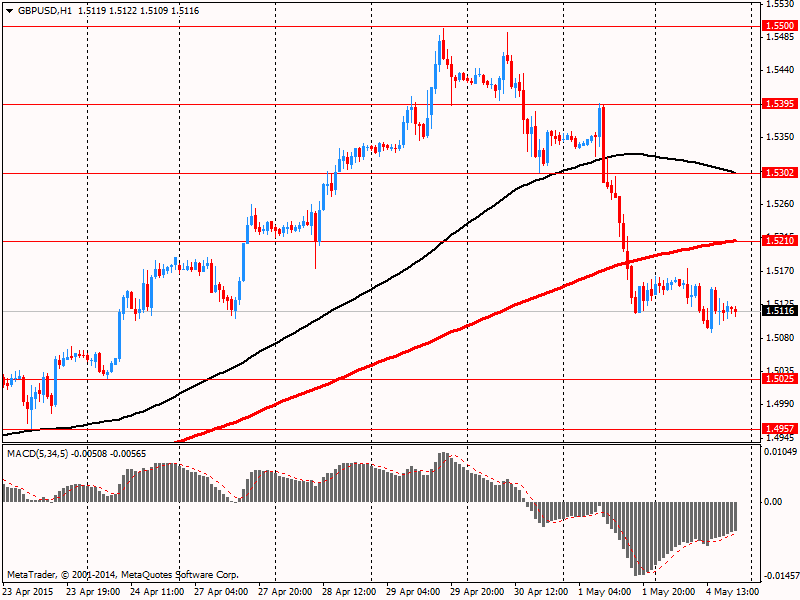- Analytics
- News and Tools
- Market News
- American focus: the dollar rose against the euro
American focus: the dollar rose against the euro
The dollar played the part of the previously lost ground against the euro, supported by data on US factory orders. The Commerce Department reported that new orders for manufactured goods increased by 2.1 percent, saying the biggest gain since last July, after falling a revised 0.1 percent in February. Economists had forecast an increase in orders of 2.0 percent in March after a previously reported 0.2 percent gain in February. Orders excluding transportation were unchanged in March after a 0.1 percent gain in February. Production was influenced by the strong dollar and lower oil prices that have held back profits flow of transnational corporations and oil companies. Department of Commerce also reported that orders for non-defense capital goods excluding aircraft - which are regarded as a measure of trust and business expenses - increased by 0.1 percent instead of the 0.5 percent drop last month. Supplies of non-defense capital goods excluding aircraft fell 0.4 percent.
The pound fell slightly against the dollar, updating the at least Friday. Investors continue to be cautious in anticipation of elections in the UK, which will take place this Thursday. "The markets are still generally ignored the uncertainty surrounding the elections, despite the fact that the results are very difficult to predict," - said James Pomeroy, an economist at HSBC. The final voting results are unlikely to be known before Friday morning. The results of the poll of Britons say the probability that none of the parties does not receive a majority of seats in parliament, and this will mean that the final rearrangement of the government will depend on the discussions that will take place after the elections, and can take several days.
Also, market participants are waiting for the publication of data on business activity in the services sector, which will be released on Wednesday. Economists expect that the results of business surveys, show that activity in the service sector grew strong pace in April (according to the forecast, the index fell to 58.6 from 58.9 in March), despite recent evidence of loss of revolutions of the economy in 2015.
The Swiss franc was little changed against the US dollar. Small influenced Swiss data. As previously reported, an indicator of industrial production stabilized in Switzerland in April, suggesting that companies are coping with the strong franc and the country can avoid recession. Index Swiss purchasing managers was unchanged in April from March and seasonally adjusted was 47.9 points. Reading in April was slightly higher than economists' average forecast of 47.7. Swiss index is still holding close to the lowest level since October 2012 and is still below 50 points, which indicates a reduction in industrial production. Production fell sharply immediately after the decision of the Swiss National banka- January 15, to give up his 3.5-year-old policy of limiting the franc of 1.20 per euro - the currency of Switzerland's largest export market. Since his fall in January, the index stabilized around 48 points, and "although such values indicate a decrease in PMI industrial activity, general economic downturn is unlikely," analysts said Credit Suisse Group AG.
© 2000-2026. All rights reserved.
This site is managed by Teletrade D.J. LLC 2351 LLC 2022 (Euro House, Richmond Hill Road, Kingstown, VC0100, St. Vincent and the Grenadines).
The information on this website is for informational purposes only and does not constitute any investment advice.
The company does not serve or provide services to customers who are residents of the US, Canada, Iran, The Democratic People's Republic of Korea, Yemen and FATF blacklisted countries.
Making transactions on financial markets with marginal financial instruments opens up wide possibilities and allows investors who are willing to take risks to earn high profits, carrying a potentially high risk of losses at the same time. Therefore you should responsibly approach the issue of choosing the appropriate investment strategy, taking the available resources into account, before starting trading.
Use of the information: full or partial use of materials from this website must always be referenced to TeleTrade as the source of information. Use of the materials on the Internet must be accompanied by a hyperlink to teletrade.org. Automatic import of materials and information from this website is prohibited.
Please contact our PR department if you have any questions or need assistance at pr@teletrade.global.


















